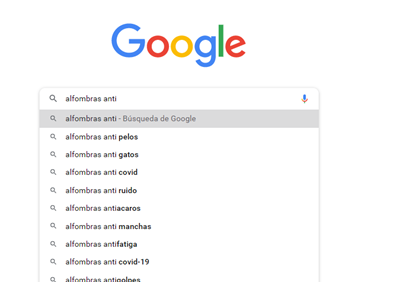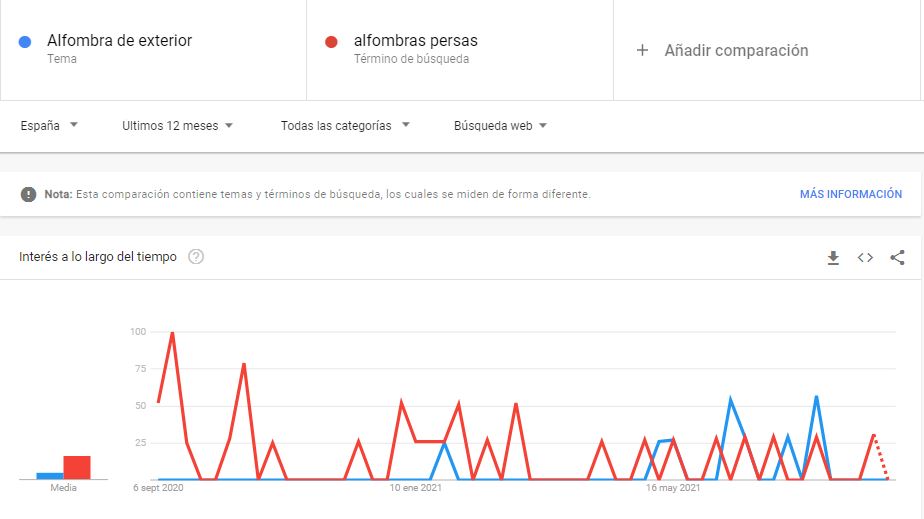Keyword research is a fundamental step in understanding our target audience or buyer persona. Therefore, in today’s post, we will delve deeper into this concept.
By the way, if you’re not completely clear on what we mean when we say buyer persona, I’ve attached this article where we go into more detail about it: Buyer persona, find your ideal customer.
What is Keyword Research?
Keyword research is a research process carried out when working on the positioning of a website, whether it is organic positioning or paid positioning.
It is true that the keywords to work on in SEO or SEM in many cases will not be the same, although it always depends on the objective being pursued in each case. We can talk at length about this, so we’ll cover it in another post later.
But then, what is the purpose of keyword research?
Let’s get to the point, keyword research helps us understand our audience better, enabling us to offer the content they want to find. Let’s use an example to understand it:
Imagine we have a website about carpets. One of the first things we’ll do is perform a keyword research (study and analysis of keywords) to identify how our target audience is searching for us.
Surely, we’ll find keywords with a clear purchase intent. That is, terms that show the user’s interest in buying. For example: buy carpets, buy carpets online, buy cheap carpets, or buy Persian carpets.
But we might also come across keywords like “carpets that don’t catch hair,” “carpets for dogs,” or “anti-hair carpets.” These types of keywords may have an informational and/or transactional or purchase intent.
At first, we might not have thought this type of content would be interesting to our target audience. But thanks to keyword research, as we can see in the attached images, we realize that it is indeed of interest.
- For example, “anti-hair carpets” has an average of 70 monthly searches and a KD of 32.

- On the other hand, “carpets for dogs” has 390 average monthly searches and a KD* (Keyword Difficulty) of 48.

*Keyword Difficulty is an indicator between 0 and 100 that helps us understand how difficult it will be to rank for that term.
A good keyword research will help us understand the user’s search intent, and thus we can develop the most suitable marketing strategy to increase both the quality traffic to our website and conversion.
How to Perform a Keyword Research
Keyword research isn’t as easy as many clients think it is. I’m sorry, but that’s how it is. (After all, that’s why we are SEO specialists).
Anyway, I’m going to give you a few tips and tools for doing a keyword research that you can start using. This way, you can establish a content plan to work on within the website or make modifications to better match the user’s search intent.
Long Tail Keywords
The concept of Long Tail focuses on the importance of understanding the vast amount of searches performed daily on the internet. With millions of queries generated every second, it is crucial for businesses to identify whether they should focus on generic terms or target more niche demands.
In the digital realm, this represents a unique opportunity to stand out in very specific market segments. The Long Tail Theory teaches us that there are three main categories of keywords:
1. **Head or short tail**: These are generic terms with high search volume, but also with high competition, making them difficult to rank for.
2. **Middle tail**: These are keywords with intermediate competition, which, although they don’t reach the volume of short tail keywords, attract a more defined audience and have a better conversion rate.
3. **Long tail**: These are very specific queries with fewer searches but also less competition, making it easier to gain visibility and conversions in the short term.
Additionally, it is essential to distinguish between positive keywords, which attract relevant traffic and improve SEO, and negative keywords, which may increase the bounce rate and attract unwanted visitors. This distinction is crucial to optimize the use of the AdWords Keyword Planner and fine-tune the digital marketing strategy.
Steps to Follow When Conducting a Keyword Research
Here are the steps to follow when conducting a keyword research:
Do a small brainstorming
Write down all the keywords that come to mind related to your service or product and all the ones you’d like to rank for on Google. Here are a couple of examples:
- I have a personal development blog, maybe I want to rank for: best personal coach, learn about personal development, how to overcome my fears, or personal growth.
- I have a wine cellar, maybe I want to rank for: best wine in Madrid, coolest wine, vintage wine, or sweet wines.
Analyze Your Competitors
Do you have a clear idea of who your competitors are? You should consider, on the one hand, those who are competing offline with you and on the other, those competing online. Once you know, investigate what keywords they are using.
Keep Your Objectives in Mind
What are you trying to achieve? As we briefly mentioned earlier, depending on the objective, you’ll approach different keywords. Some of the objectives you may have include: branding, increasing sales, generating leads, increasing traffic…
Use Tools to Help Determine the Keywords to Work On
Among all the terms or possible search intents we’ve chosen, we need to select which ones we should focus more on. These tools provide us with data based on which we can decide.
Tools for Keyword Research
- Ubersuggest: https://neilpatel.com/es/ubersuggest/
This is a very useful tool with a simple interface to understand and use. It will help you save a lot of time. The data is pulled directly from Google Autosuggest.
- The Google Search Engine
Sounds unbelievable, right? Who knows more than Google about its users? Take advantage of it! As you know – and if you don’t, I’m telling you now – when you make a search, Google suggests related searches.

- Google Trends: https://trends.google.es/trends/?geo=ES
This tool allows us to see the search trends throughout the year for different search terms and even compare them. It’s also useful to identify keywords that experience higher searches during specific times of the year or that show a growing or declining trend.

- Answer The Public: https://answerthepublic.com/
This tool is especially useful for looking for different terms related to a keyword you’ve already selected. Basically, it provides a large amount of ideas related to that keyword.
– Keyword phrases with prepositions
– Comparisons
– Related terms

These are just some of the tools available for keyword research. Additionally, there are paid options like Semrush or Ahrefs. But at least for starting to play with keywords, these mentioned tools will be very helpful!
I hope you find this post useful and if you have any questions, as always, we are here! If you want to speak with an SEO consultant who can help you conduct a keyword research for your business, don’t hesitate to reach out!



